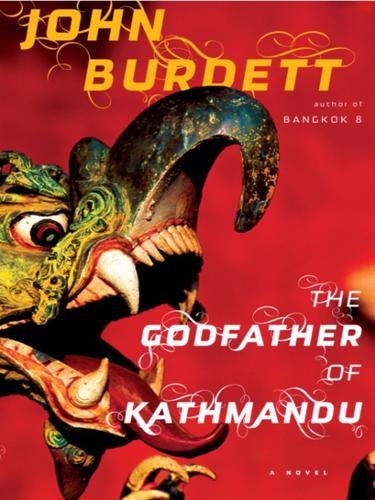
The Godfather of Kathmandu
A Royal Thai Detective Novel (4)
کتاب های مرتبط
- اطلاعات
- نقد و بررسی
- دیدگاه کاربران
نقد و بررسی

August 17, 2009
The vivid portrait of 21st-century Thailand in part redeems the meandering plot of Burdett's fourth thriller to feature corrupt Bangkok police detective Sonchai Jitpleecheep (after Bangkok Haunts
). Jitpleecheep, a marijuana-smoking Buddhist whose marriage collapsed after his young son's death, investigates the peculiar murder of Frank Charles, a Hollywood director who regularly visited Thailand to sample the sexual delights offered by its young women. Someone disemboweled Charles, then cut his skull open and dined on his brains. Among the victim's books at the crime scene are The Silence of the Lambs
and Hannibal
. Too much musing on spiritual awakenings and Tibetan philosophy as well as commentary on mundane details of daily life distract from the search for Charles's killer and a related subplot involving the heroin-smuggling operation controlled by Jitpleecheep's boss, Colonel Vikorn. Hopefully, Burdett will regain his usual narrative snap next time.

Starred review from September 15, 2009
Distinguishing crooks from good guys is only one of the pleasures and challenges offered by the fourth in Burdett's series chronicling the morally compromised adventures of Thai policeman Sonchai Jitpleecheek (Bangkok Haunts, 2007, etc.).
The framing story concerns Sonchai's assignment to protect his greedy boss Colonel Vikorn's graft from Bangkok's illegal enterprises against the ambitions of the latter's brutal superior General Zinna. Offering to help Vikorn come out on top is defrocked Tibetan lama Tietsin, who also peddles drugs and is rumored to be fomenting Tibet's takeover of China. Distracting from their campaign against Zinna is the nasty murder of morbidly obese American film director Frank Charles, as well as the detainment of a hot babe drug mule who Knows Too Much For Her Own Good. Sonchai shuttles among Nepal, Hong Kong, Kathmandu and other places of interest, haunted by recurring memories of his six-year-old son's terrible illness and death. Further bedevilments are provided by his estranged wife, Chanya, his law-defying pragmatic mom, Nong, and such troublesome dames as sexually available"actress" Tara and elusive Doctor Moi,"the most exotic criminal in Thailand." The movies are of course materially involved. Colonel Vikorn avidly studies the Godfather films and adopts Corleone family power tactics (e.g., anointing Sonchai his consigliere). A notorious noir film, if re-mastered, may answer the burning question: Did Frank Charles fake his own death? Though the novel is top-heavy with redundant interview-interrogations, Sonchai's wry narrative voice (think: exotic Philip Marlowe) keeps us hooked until General Zinna pulls off a climactic double-cross and Sonchai begins to understand how Tietsin just may accomplish"the silent invasion of China by Tibetan thought."
A blissfully nutty caper that brings back fond memories of the late lamented Ross Thomas' crazy-quilt crime fiction.
(COPYRIGHT (2009) KIRKUS REVIEWS/NIELSEN BUSINESS MEDIA, INC. ALL RIGHTS RESERVED.)

September 1, 2009
Detective Sonchai Jitpleecheep ("Bangkok 8, Bangkok Tattoo", and "Bangkok Haunts") of the Royal Thai Police generally investigates crimes involving "farangs", or Westerners, because he is half "farang" himself. But rival Sukum wants a high-profile case involving a famous American because he hopes that it will allow him to finally attain his long-desired promotion. This suits the preoccupied Sonchai, who has been made police colonel Vikorn's "consigliere" in the matter of a purchase of $40 million worth of opium from a mysterious Tibetan refugee in Nepal. Dr. Tietsin has also become the grieving Sonchai's guru in the ways of Tibetan Buddhism. Sonchai's son has recently died, and his wife has left him to become a nun. VERDICT The central mystery here is not the "Case of the Fat Farang" but whether Sonchai will survive his own internal conflicts of guilt, grief, bliss, and duty. Obviously, this is not your typical police procedural, but it will reward mystery readers ready for something unusual. Fans of Timothy Hallinan's Bangkok mysteries might like it.Eric Norton, McMillan Memorial Lib., Wisconsin Rapids
Copyright 2009 Library Journal, LLC Used with permission.

Starred review from September 1, 2009
Through three previous novels (most recently, Bangkok Haunts, 2007), Burdetts Sonchai Jitplecheep, the Thai police detective whose mother runs a brothel and whose boss is a drug kingpin, has leapfrogged the field, vaulting from cult favorite to just possibly the most compelling crime-fiction hero in the genre. His fourth adventure, even more than its predecessors, is overstuffed with a dizzying array of multifaceted storylines, all of which exude both the moral ambiguity and the cognitive dissonance that have become this series hallmarks. Sonchai, reeling from a personal tragedy, has turned to meditation for solace and with the help of a new guru, the enigmatic Tietsin, an exiled Tibetan lama based in Kathmandu, has begun to practice apocalyptic Buddhism. On the more terrestrial front, however, he faces a doozy of a case: the murder of an American film director whose skull was apparently sliced open with a saw, as one would cut the top off a cocoanut. But thats not all. Sonchais boss, Colonel Vikorn, who has been watching a little too much Godfather, wants Sonchai to become his consigliere and broker a massive heroin sale with Vikorns arch rival from the Thai army. The seller: none other than Tietsin, the holy man. Burdett juggles the various plots with great dexteritynaturally they all eventually overlapbut this time each is so rich in ambiguity and multiple levels that many readers may wish for a meal with fewer courses. But that, Sonchai would surely remind us, says more about our limited farang consciousness than it does about this whirlwind of a novel.(Reprinted with permission of Booklist, copyright 2009, American Library Association.)

























دیدگاه کاربران